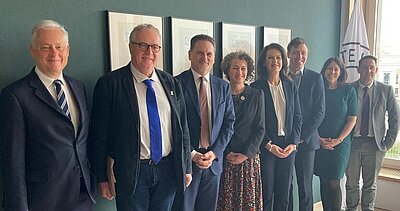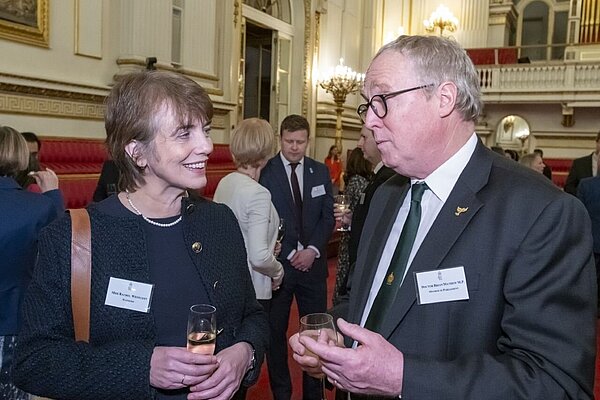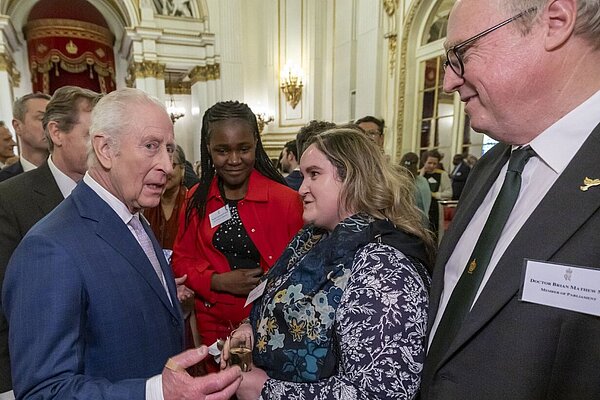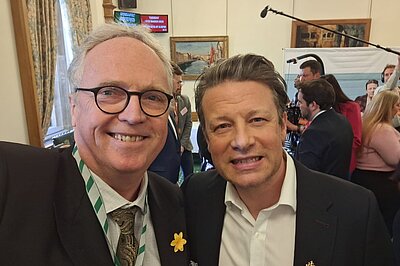MP Newsletter #9: Labour welfare cuts, overseas aid crisis, Wiltshire traffic strategy
Dear reader,
A very warm welcome to this latest edition of my newsletter, I hope you’ve found some time this week to enjoy some of the sunshine.
It’s certainly felt like spring is finally in the air!
It has been another whirlwind fortnight with engagements across the constituency, around Westminster and a very brief overseas trip too.
As ever, I welcome all feedback and comments about this newsletter, and I want to make sure that it is as useful as it can be for my constituents. If you have any suggestions, comments or feedback please do feel free to email me at brian.mathew.mp@parliament.uk. A reminder that you can also contact my office on 01225 434216, and please do get in touch via phone or email to book a surgery appointment. These take place at regular intervals at different villages and towns across the constituency and we will do our very best to fit you in at the one which suits you best.
Remember you can follow me on Facebook here and I’m also on Twitter here.
Please do also forward this newsletter along to friends, family, neighbours etc if you feel it would be useful for them too. They can also sign up to receive these emails here.
Devastating cuts to aid
I’m afraid I need to begin on a rather worrying subject following my flying visit to Geneva with the International Development Select Committee earlier this week.
Along with other members of the committee, we visited several UN departments and agencies as well as the headquarters of the World Health Organisation (WHO). These sorts of trips are planned months in advance and the purpose here was to gather evidence for a report into international humanitarian law (IHL).
However, world events have rather overtaken us and as we landed in Geneva we heard news of the recent attacks in Gaza which have left more than 400 dead – added to this we are also still coming to terms with Trump’s gutting of the American aid department (USAID).
In Geneva, we saw first-hand the very real disasters which could occur due to the Americans withdrawing from the aid scene. The WHO has an early warning system which allows them to alert the world to health emergencies when they are first diagnosed. We saw this system put into action recently with the COVID-19 outbreak in 2020, and it has also performed similar vital roles in recent Ebola and Marburg virus outbreaks.
Staff that work on this early warning system have been sent home due to the US cuts, and this leaves all of us in a more dangerous world. We also heard how aid workers administering life-saving HIV medication have also been ordered to stop work. Make no mistake, people will die as a result of these cuts – not to mention that we are all at significantly increased risk from the diseases that the early warning system has been picking up for years. We live in such a small, connected world now, and COVID showed that can have devastating consequences.
The report will be released by the IDC in the coming weeks, and I will continue to speak out about what I am seeing on the ground and when hearing evidence from experts. I understand that sacrifices will need to be made to increase our defence budget here in the UK, but surely there is a better way than cutting our aid. I’d like to see significantly higher taxes on our social media companies, for example.

Labour’s welfare cuts
Earlier this month, the government unveiled their plans to cut welfare for the very poorest, including Personal Independence Payments (PIP). These payments are vital to so many disabled people and their families.
I know these cuts are a source of great consternation for the many who rely on PIP to meet the increased costs living with a disability can bring.
Disabled people no longer receive sufficient financial support. The move to Personal Independence Payments (PIP) from Disability Living Allowance introduced several barriers to people getting the support that they need.
Mandatory Reconsideration was introduced as an extra step in the process, meaning that people must ask the Department of Work and Pensions (DWP) to reconsider their application before they can appeal a decision. This process too frequently simply reaffirms the initial decision and just means a delay and more time that people are not getting the support that they need, before legal appeals can rectify the situation.
The process is confusing and stressful and can cause health conditions to worsen. Work capability assessments are failing people with disabilities.
While the aim of getting more people into work is an admirable one, the government is going the wrong way about it and causing unnecessary stress for some of the most vulnerable in our society. If the government was serious about cutting welfare spending it would get serious about fixing health and social care.
That is why it has been so disappointing to see the Government’s lack of urgency in this area, putting their social care review on a three-year timeline, kicking projects like new hospitals into the long grass.
As Liberal Democrats, we have set out ways to fix the benefits system and make it work better for disabled people. We have urged the Government to engage meaningfully with disabled people, their families, and relevant advocacy organisations to guarantee that reforms to the benefits system truly address the needs of those with disabilities without undermining their rights to autonomy and dignity.
We would also bring Work Capability Assessments in-house and reform PIP assessments to make the process more transparent and stop unnecessary reassessments, and end the use of informal assessments.
Dorset coast to M4 strategy
National Highways has published their M4 to Dorset Coast Connectivity Strategic Study. This is a very dry name for what is actually a very important study which could have a substantial impact on our constituency.
The current network route from the Dorset coast up to the M4 makes use of both the A36 and A46, via Bath and then through Wiltshire via Warminster and Salisbury. The study also looks at this current network and the potential to adopt an alternative corridor as the main strategic route for the area.
The study highlights this alternative corridor as the A350 from the M4, via Chippenham, Melksham and Westbury, before then moving to the A36 at Warminster via Salisbury and then south. Based on the findings of the study, a programme of road upgrades could then be made to improve this corridor to link the M4 to the Dorset coast.
I welcome this study and its aims of safer and more reliable journeys through Wiltshire. Potential upgrades to the existing road network would benefit our area and allow for a more strategic outlook on the movement of traffic from the Dorset coast to the M4.
But we see large volumes of traffic in this part of Wiltshire and any changes must put residents and local businesses at the heart of what they seek to do. I have concerns over potential increases in HGV traffic on this route, and I would also like to see greatly improved walking and cycling routes.
I will engage with National Highways and Wiltshire Council on this topic and update you all when there is more to say.
Water and Climate reception
Before becoming an MP, I spent years working for WaterAid UK, mostly on projects in the developing world focusing on WASH (Water, Sanitation and Hygiene).
It was a privilege to be invited to the Water and Climate Reception at Buckingham Palace, hosted by His Majesty The King in support of WaterAid UK.
It was truly heartening to be in a room filled with such passionate and dedicated individuals - leaders who have the ability to make water a real priority on the global agenda. Now, more than ever, it is critical that we stand together and take collective action to address the water and climate crisis.
The reception served as a powerful reminder that the climate crisis is a water crisis.
I will continue to advocate for further work in this area as we seek to combat climate change.


Jamie Oliver bringing dyslexia into the spotlight
Dyslexia is my superpower.
I have always thought this way. It allows me to think about problems from a different angle and helps me to find and work through solutions which don’t always present themselves to others.
Support for those with dyslexia is far from perfect however, and it was inspiring to speak to TV chef and fellow dyslexic Jamie Oliver about this in parliament recently. He’s leading a campaign to ‘fix the system, not the kids’ which is campaigning to improve inclusion in classrooms for those with dyslexia.
We need to spot the signs earlier and improve and increase screening and back our teachers on this!

Westminster Watch
A reminder that you can view my spoken contributions in parliament here and a full list of my written questions here.
Recent written questions have been asked on topics including gene therapy, protecting Wiltshire chalk streams, increased research into rare diseases, and visas for Ukrainian refugees.
Best wishes,
Brian Mathew MP
Your Lib Dem MP for Melksham & Devizes
